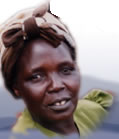THEMES IN THIS
TESTIMONY
Agriculture

Education

Family Life

Health

History

Identity

Livestock

Population

Spiritual Beliefs

Click on arrows
to find more
testimonies
featuring
these themes
|
|
Sex
|
Male
|
|
|
Age
|
86
|
|
|
Identity
|
Sabaot
|
|
|
Occupation
|
Former pastoralist – now a farmer
|
|
|
Location
|
n/a
|
|
|
Date
|
November 1996
|
|
summary
A short interview, but nevertheless with some useful material, and honest insights into polygamy, education, traditional and modern medicine, tribal conflicts, and Independence. The most interesting aspect is the recurring theme of how Sabaot life and culture has changed during the narrator’s lifetime.
Joseph provides us with his own perspective on polygamy, one of his theories being, that women gain more freedom and status in such an arrangement, but that this freedom my result in infidelity. He confesses, and says that most of his wives actually divorced him, probably due to his excessive jealousy and “strictness”. “Actually it is not that polygamy is bad, it is only that it has more challenges, and is more difficult to manage than a monogamous family.” He believes that polygamy suits some more than others, and therefore people should be able to choose which model of marriage they would prefer. But nowadays “most of the men…have been influenced by the Christian religion, which discourages polygamy, and this explains why many men are only marrying a single wife today.”
Another interesting point Joseph makes is how conflict between different communities was an accepted fact in the past, and revolved mainly around cattle rustling: “That time we were not mixed up like we are today, because each community used to occupy its own territory. I must also admit that there was absolute hatred for other communities. And the main source of conflict was cattle rustling…this was just a continuous thing, because they would steal our cattle and we would also [get] revenge by hitting back…all of us were socialised to this kind of life.” And indeed, he talks about set rules within the conflict “for it was considered that there was no bravery in killing a woman or a child.”
Joseph believes that Independence did not improve life for most people, a view that seems to surprise the (much younger) interviewer. “What I am saying is that, us ordinary people do not see any advantages that we have [been] given, now that we have an African government. I think that it is only the leaders up there who are enjoying [Independence].”
detailed breakdown
|
You will need a password from Panos to view the full
transcript of the interview. To apply for a password, click here.
Once you have a password, click here to go to the beginning
of the transcript. You can also click on any section of the
breakdown of content below and go straight to the
corresponding part of the transcript.
|
| Section 1-2 |
Discussion of polygamy.
|
| Section 2-3 |
Narrator is not a Christian because, he says, he didn’t go to school: “…at the time Christianity was introduced, it was going hand in hand with education, which cost money.”
Describes how and why he insisted on educating both his sons and his daughters:“…schools were not easy to come by on this side of the mountain…In fact it is only now that education is beginning to take root in Sabaot land. The Sabaot would have enjoyed education earlier but our Bukusu neighbours frustrated our efforts to access education through their notorious chiefs. Another point is that [education] favoured a settled life, but as you know, the Sabaot were pastoralists who moved from one place to another in search of green pasture for our livestock.
|
| Section 3-4 |
Discussion of witchcraft, why it has declined and how it used to operate. How a person who was bewitched was treated - herbs and prophets.
|
| Section 4 |
Survival of traditional herbal medicine alongside modern methods: “…the herbalist could be surviving because medical facilities are not easily accessible here. The high cost of modern medicine has also turned people away from them. You know that even original herbalists did not actually charge so much for their services.” Sees both methods as “…playing a complementary role…”, each good at curing certain diseases.
|
| Section 5 |
Sees family planning as a good thing for those families with restricted resources, but worries that the general Sabaot population is still too small.
|
| Section 5-6 |
Change in crop cultivation over the years. Describes how in the past there were many serious famines but no aid. Less famine nowadays due to improved farming methods - but lack of capital still frustrates their efforts.
|
| Section 6 |
Past conflicts between tribes - revolved around cattle rustling and had set rules.
“It was always very honourable to bring home livestock from a raid, because this emphasised the fact that you were brave and courageous man.”
|
| Section 7 |
Describes the tension between Bukusu and Sabaot. Claims the Bukusu impeded development and look down on the Sabaot. The narrator sees the two communities as very different.
|
| Section 8 |
Doesn’t see many positives about Independence - believes life was better under white rule; for example the police steal people’s property, prices are not standardised, and school fees are high.
|
| Section 9 |
Discusses the banning of beer, which he believes to have been influenced by Christianity - sees brewing as closely connected to the traditional culture. “I think people should be left alone to make their own choices. If you like beer, you can take it, and those who do not like it, can leave it for others. Otherwise imposing a ban that all people should not take this beer is very bad, and I think it is unfair for us who like this beer very much. This beer was the integral part of our leisure. When we wanted to relax and discuss something, we did this while drinking.”
|
|


